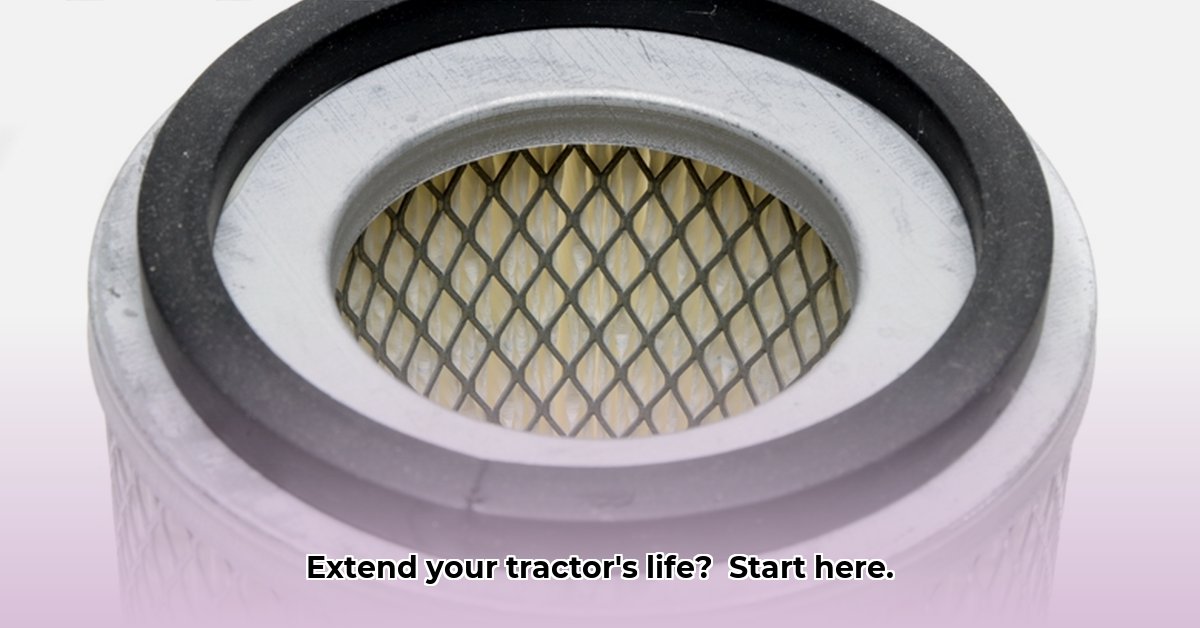
Choosing the Right Tractor Supply Air Filter: A Comprehensive Guide for Farmers
Keeping your farm equipment running smoothly is critical for a successful harvest. A frequently overlooked component impacting performance and longevity is the air filter. This guide focuses on Tractor Supply air filters, providing practical advice on selection, installation, and maintenance to maximize your equipment's lifespan and efficiency. We’ll cover everything from understanding your engine’s needs to extending the life of your filters, ensuring your tractors and machinery breathe easy. For more resources, check out this helpful guide on air filter selection.
Understanding Your Air Filter Needs: The Foundation of Efficient Operation
Before selecting an air filter, consider these crucial factors: Your tractor's make and model, operating environment, and frequency of use. Why is this important? Because neglecting these considerations can lead to premature wear, increased fuel consumption, and costly repairs.
Matching Your Filter to Your Tractor
Always consult your owner’s manual! It provides the exact specifications (size, type) for your tractor's air filter. Using an incorrect filter can damage your engine. This single step prevents significant problems and ensures optimal performance.
Environmental Impact: Dust, Debris, and Filter Selection
The environment your tractor operates in significantly impacts filter choice. Dusty field work demands more frequent changes than operations primarily on paved surfaces. Heavily dusty environments may even require high-efficiency or heavy-duty filters to combat the increased particulate matter. In contrast, less demanding conditions may only require standard filters.
Usage Intensity: Frequency of Use Matters
How often and how intensely you use your equipment directly relates to filter lifespan. Frequent, heavy use necessitates more frequent filter inspections and replacements. This proactive approach minimizes downtime and maintains peak engine performance.
Deciphering Tractor Supply Air Filter Options
Tractor Supply offers a range of air filters to meet diverse needs. Understanding the differences is key to making an informed decision, reducing future maintenance costs, and extending engine life.
Filter Types Compared: Performance, Cost, and Lifespan
The table below summarizes key characteristics of common Tractor Supply air filter types. Remember, these are general guidelines; always check the specific product information for precise details. Choosing the optimal filter balances airflow, particle filtration, and cost-effectiveness.
| Filter Type | Particle Size Removal | Airflow Rate | Cost | Typical Lifespan | Best Suited For |
|---|---|---|---|---|---|
| Standard | Moderate | Good | Low | 6-12 Months | Less demanding environments, infrequent use |
| High-Efficiency | Excellent | Moderate | Medium-High | 12-24 Months | Moderately dusty environments, frequent use |
| Heavy-Duty | Excellent | Good | High | 18-24 Months+ | Extremely dusty environments, intensive use |
Step-by-Step Air Filter Replacement: A Practical Guide
Replacing your air filter is a straightforward process, but proper technique ensures optimal performance and engine health.
- Safety First: Turn off and allow your tractor to cool completely before starting any maintenance.
- Locate the Filter Housing: Consult your owner’s manual to pinpoint the filter's location.
- Remove the Old Filter: Carefully remove the old filter, noting its orientation for correct reinstallation. Inspect the filter; significant clogging indicates a need for more frequent filter changes.
- Install the New Filter: Insert the new Tractor Supply filter, ensuring correct orientation and a tight seal.
- Test and Monitor: Start your tractor and listen for any unusual noises. Regularly inspect your air filter for signs of excessive dust and dirt.
Prolonging Air Filter Life Through Effective Maintenance
While regular replacement is essential, proactive maintenance significantly extends filter lifespan.
- Regular Inspections: Inspect your air filter every few weeks (more often in dusty conditions). Early detection prevents major problems.
- Pre-Filter Installation (Optional): A pre-filter acts as a barrier, trapping larger particles before they reach the main filter, considerably extending its life.
- Proper Storage of Spare Filters: Store spare filters in a clean, dry location to prevent premature degradation.
Isn't it worth a few minutes of your time to significantly improve both the performance and longevity of your valuable farming equipment? By following these straightforward steps, you'll not only save money on replacements but also ensure your equipment runs efficiently and reliably for years to come. Remember, preventative maintenance is the key to maximizing your return on investment!